Programming languages popularity
Since the beginning of the computer, hundreds of programming languages have been designed. However, a relatively few proportion of these were actually put to practical use in the industry. Some languages have been developed and/or adopted by the academic community for teaching purposes but did not really come into practical use either. Due to their adoption in University computer science programs, such languages can boast great popularity, but still failed to have become popular for extensive industrial software development. Many factors or indicators can be used to measure the popularity of programming languages. Here we discuss various surveys that have been made to measure the popularity of programming languages.
Contents |
langpop.com
The methodology and results presented here are based on: [1]. It uses various web sites as a data source to extract indicators of programming languages' popularity rankings.
Yahoo Search
Arguably, the popularity of a programming language can be measured by the number of web pages discussing it. Yahoo provides an API for doing customized searches on its web pages indexing database. Searching for various programming languages' names, [2] arrives to the conclusion that the programming languages most referred to on the web are: C++, C, Java, and PHP, as shown on the extracted figure: 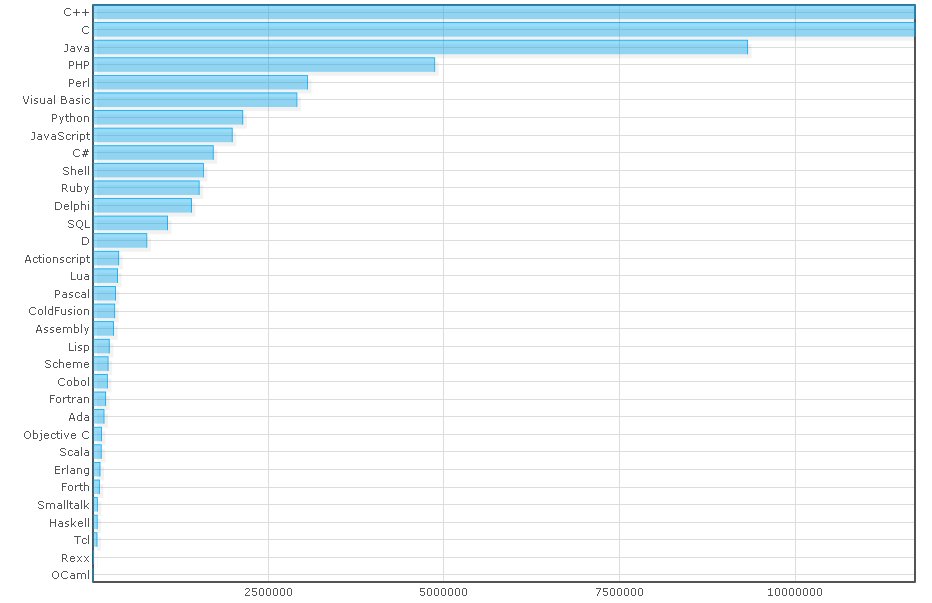
Job Postings
Since industry demand is probably a more relevant indicator of a language's popularity, one might search a job offering database and search for specific programming languages being asked for in job offerings. Based on a search of craigslist.org, [3] arrives to the conclusion that PHP, SQL, C, C++, Java, JavaScript, and C# are the most in-demand languages, as shown on the extracted figure: 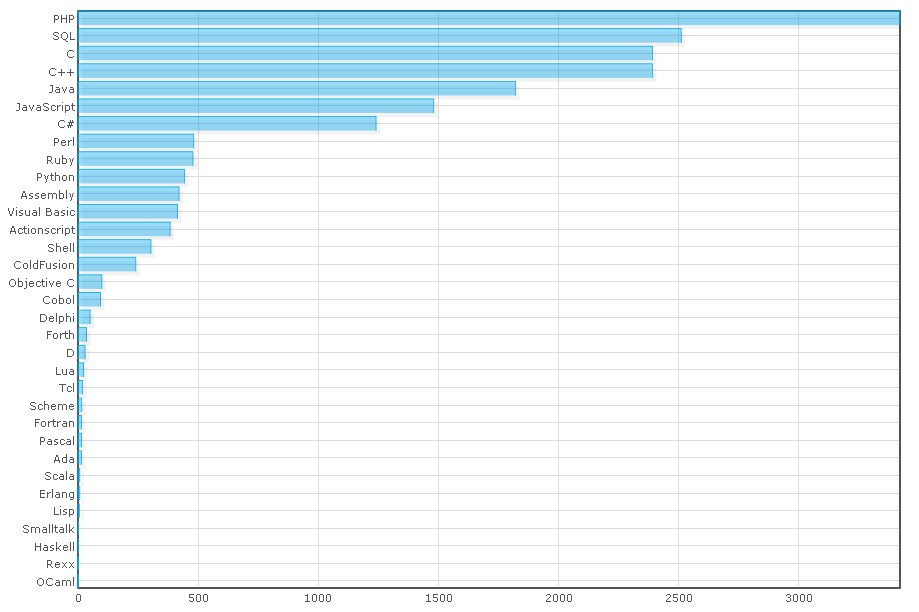
Books
Arguably, the more a programming language is popular, the more books are being sold explaining how to use it. In [4], a search is made to a bookstore database to figure out what languages are more popular as books' topics. It arrives to the conclusion that Java, C++, VisualBasic, C#, and C are the most popular from this regard, as shown on the extracted figure: 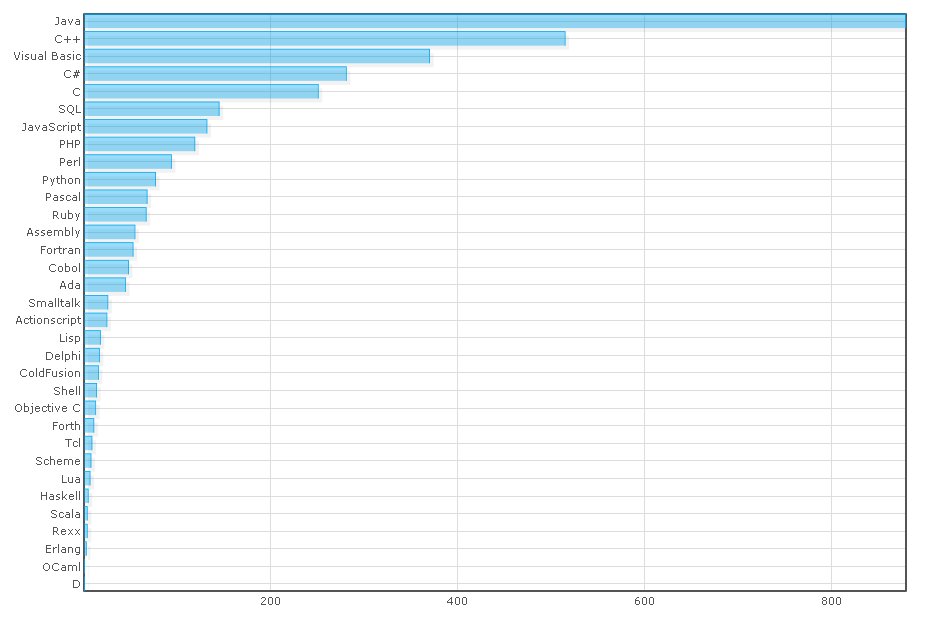
Open source code repositories
The open source code development community provides a public a free source of information that can be used to measure the popularity of programming languages effectively used by developers. In [5], a search is made on various open source code repositories and the programming language used in each open source project is extracted.
freshmeat.org
While searching the freshmeat.net open source community web site, it showed that C, Java, C++, PHP, Perl, and Python are the most popular, as shown in the extracted figure: 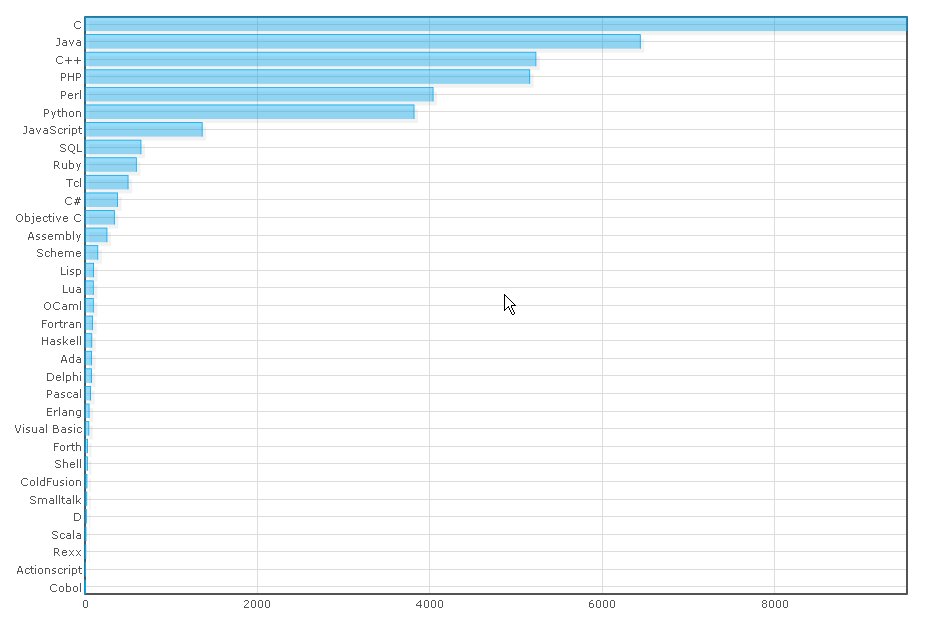
Google code
Doing a similar search on the Google code web site (http://www.google.com/codesearch), it was extracted that (as for the results for freshmeat.org) C, Java, C++, PHP, Perl, and Python are the most popular languages, as show on the extracted figure: 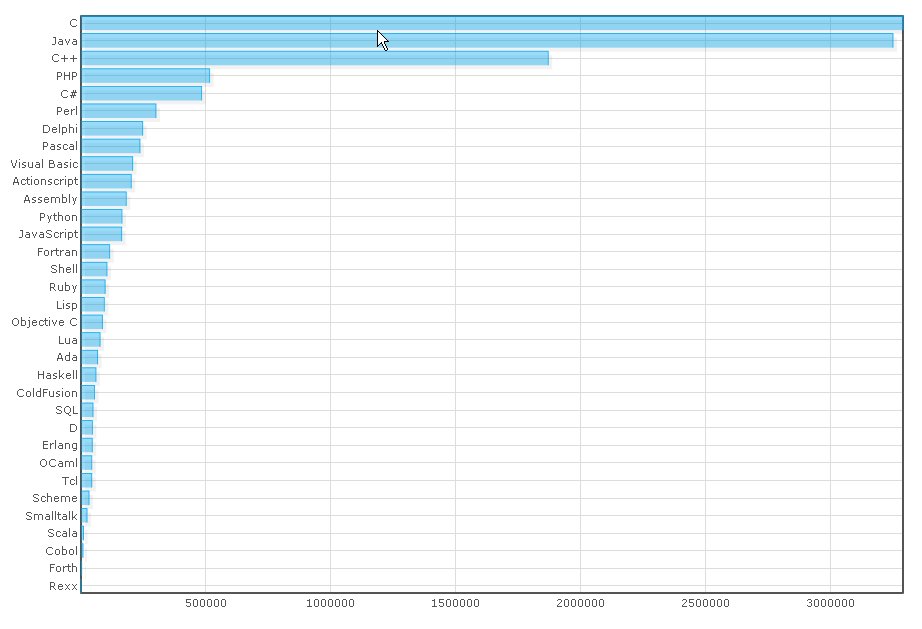
ohloh
Doing yet another similar search on the Ohloh web site (www.ohloh.net), it was extracted that, quite differently from the two previous results, Java, C, C++, JavaScript, Shell, Python, and PHP are the most popular languages, as shown in the figure: 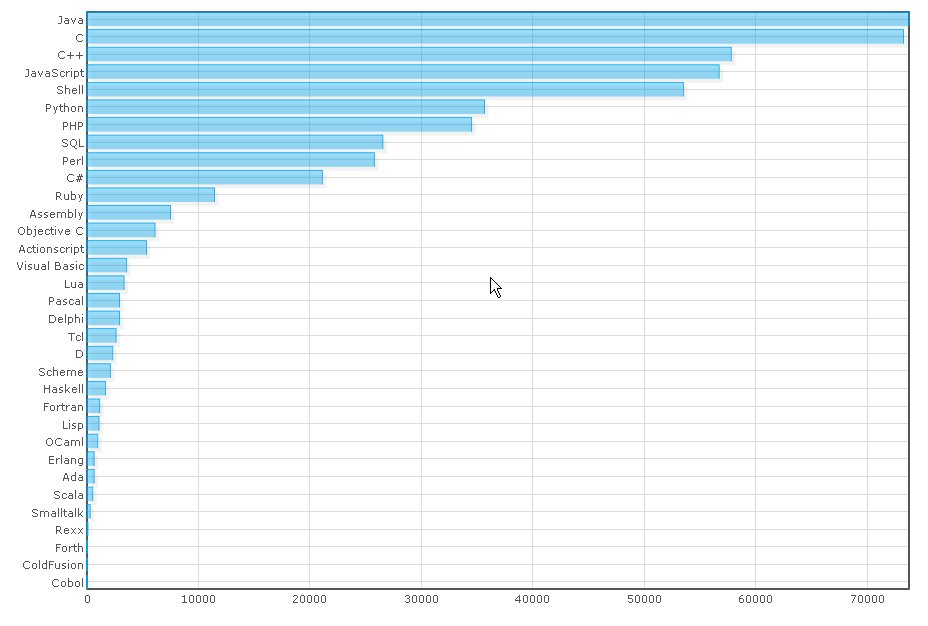
Discussion sites
Another relevant source of information to measure the relative popularity of programming languages is public discussion sites, where programmers discuss technical issues among themselves. In [6], the following discussion sites were searched for: lambda-the-ultimate.org, slashdot.org, programming.reddit.com, and freenode.net. Overall, the results of these searches revealed that Java, C, C++, C#, PHP and Python are the languages that the programmers communities are the most discussing among themselves, as shown in the extracted figure: 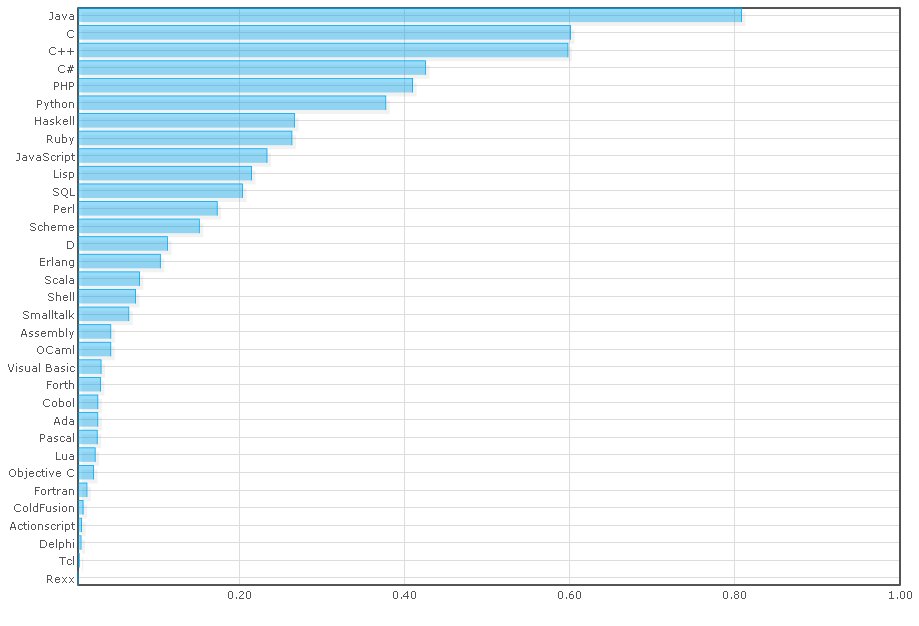 .
.
Notably in the search on public discussion sites, lambda-the-ultimate.org is a site that is very popular particularly with the academia circles. Searches on this site has revealed a different taste in academia, showing that languages like Haskell, Lisp, Scheme, Python, Erlang, Ruby, Scala, Smalltalk, and Ada are popular discussion topics in academic circles, as shown in the extracted figure: 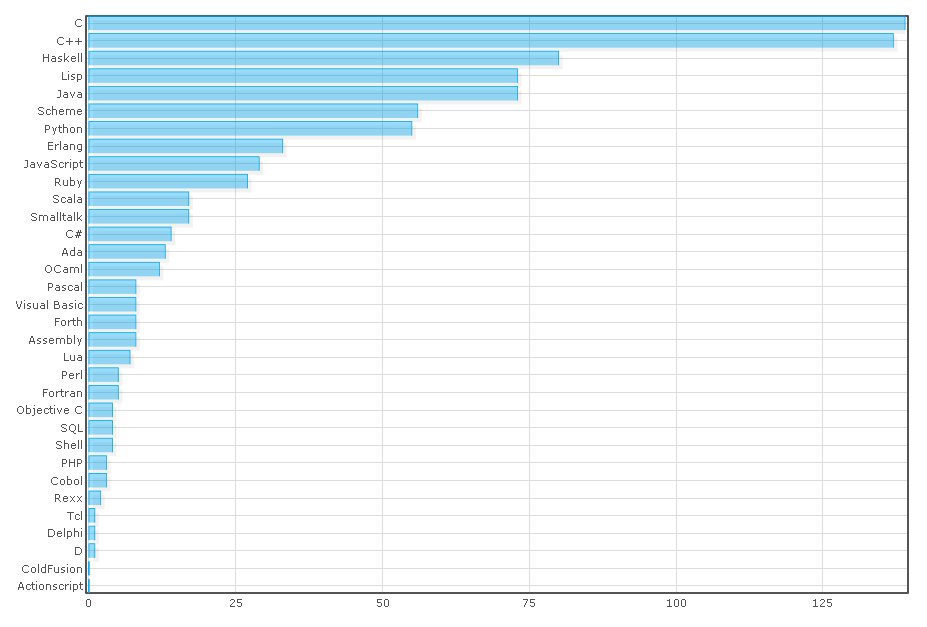 .
.
www.tiobe.com
The results presented here are based on a monthly survey done by Tiobe Software (www.tiobe.com). As stated on the "Tiobe index" web page updated monthly, the TIOBE Programming Community index gives an indication of the popularity of programming languages. The index is updated once a month. The ratings are based on the number of skilled engineers world-wide, courses and third party vendors. The popular search engines Google, MSN, Yahoo!, Wikipedia and YouTube are used to calculate the ratings. Observe that the TIOBE index is not about the best programming language or the language in which most lines of code have been written. The data presented here is as of March 2010.
Top 20 programming languages (March 2010)
According to the TIOBE index (March 2010), the top 20 most popular programming languages are depicted as in the extracted figure: 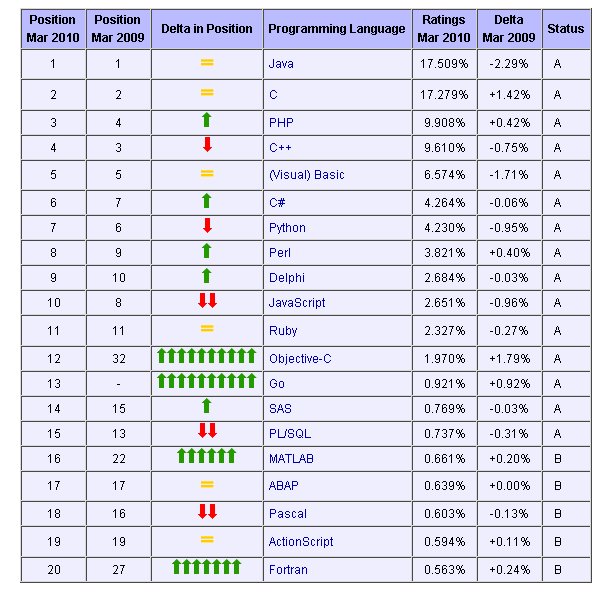 .
.
Long-term trend
As the TIOBE index is calculated monthly, and has been there for a long time, it is very interesting to see long-term trends in the history of programming languages popularity, as depicted in the extracted figure: 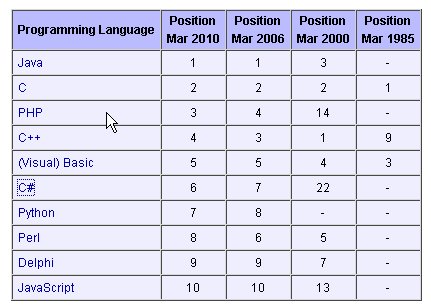 .
.
Categories of programming languages
The TIOBE index also enables the categorization of popular programming languages. The results are as depicted in the extracted figure: 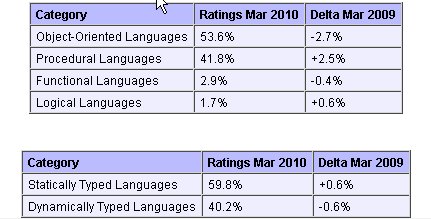 .
.